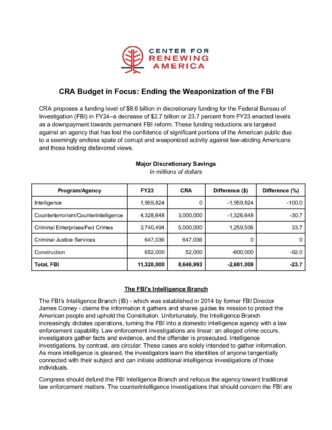
CRA Budget in Focus: Ending the Weaponization of the FBI

CRA proposes a funding level of $8.6 billion in discretionary funding for the Federal Bureau of Investigation (FBI) in FY24–a decrease of $2.7 billion or 23.7 percent from FY23 enacted levels as a downpayment towards permanent FBI reform. These funding reductions are targeted against an agency that has lost the confidence of significant portions of the American public due to a seemingly endless spate of corrupt and weaponized activity against law-abiding Americans and those holding disfavored views.
Major Discretionary Savings
In millions of dollars
| Program/Agency | FY23 | CRA | Difference ($) | Difference (%) |
| Intelligence | 1,959,824 | 0 | -1,959,824 | -100.0 |
| Counterterrorism/Counterintelligence | 4,328,648 | 3,000,000 | -1,328,648 | -30.7 |
| Criminal Enterprises/Fed Crimes | 3,740,494 | 5,000,000 | 1,259,506 | 33.7 |
| Criminal Justice Services | 647,036 | 647,036 | 0 | 0 |
| Construction | 652,000 | 52,000 | -600,000 | -92.0 |
| Total, FBI | 11,328,000 | 8,646,993 | -2,681,009 | -23.7 |
The FBI’s Intelligence Branch
The FBI’s Intelligence Branch (IB) – which was established in 2014 by former FBI Director James Comey – claims the information it gathers and shares guides its mission to protect the American people and uphold the Constitution. Unfortunately, the Intelligence Branch increasingly dictates operations, turning the FBI into a domestic intelligence agency with a law enforcement capability. Law enforcement investigations are linear: an alleged crime occurs, investigators gather facts and evidence, and the offender is prosecuted. Intelligence investigations, by contrast, are circular. These cases are solely intended to gather information. As more intelligence is gleaned, the investigators learn the identities of anyone tangentially connected with their subject and can initiate additional intelligence investigations of those individuals.
Congress should defund the FBI Intelligence Branch and refocus the agency toward traditional law enforcement matters. The counterintelligence investigations that should concern the FBI are those pertaining to espionage, counterproliferation, and foreign illicit finance, among other issues.
The FBI’s Intelligence Branch creates dozens of Senior Executive Service (SES) positions. These posts must be eliminated. Moreover, the Intelligence Branch partners with other government agencies, private sector institutions, and academic communities to further its intelligence-gathering aims and circumvent privacy protections under the guise of “national security.” These dubious partnerships facilitate censorship of protected speech and illegal searches of private information.
A recent whistleblower disclosure concerning an FBI intelligence report about “Radical Traditional Catholics” relied on information from left-leaning political entities like the Southern Poverty Law Center, Salon.com, and The Atlantic. There were no counterbalancing sources, and it would appear the report was a political grievance list used to create the predicate for a national security investigation of lawful First Amendment-protected activity. In this case, the author identified pro-life, pro-traditional marriage, and pro-border protection policy preferences as an ideological gateway to radicalization against the government. Taxpayer funding should not support these activities.
The FBI’s National Security Branch
The FBI established the National Security Branch in September 2005 as part of its mission to detect, deter, and disrupt national security threats in the wake of the 9/11 terrorist attacks. The branch collects, analyzes, and shares intelligence to understand and defeat these threats while preserving civil liberties. Unfortunately, bureaucratic mission creep and arbitrary performance metrics lead the FBI’s National Security Branch to unjustifiably target groups of Americans disfavored by the regime.
In order to continually justify its outsized budget and power, the FBI increased its focus on “homegrown violent extremists” (HVEs). The FBI defines these actors as persons who live and operate primarily in the US while advocating or engaging in ideologically motivated terrorist activities in furtherance of objectives promoted by foreign terrorist organizations. The FBI is incentivized by an arbitrary system of performance metrics – the Integrated Program Management system – to target and ensnare Americans in the counterterrorism dragnet. For example, in the years after 9/11, Muslim Americans were routinely targeted for entrapment by the FBI as part of its focus on HVEs.
In recent years, the FBI’s counterterrorism mission shifted from homegrown violent extremism to “domestic violent extremists” (DVEs). The FBI characterizes these individuals as seeking to further political or social goals through unlawful acts of force or violence. Although the FBI publicly states that mere advocacy of political positions, activism, use of strong rhetoric, or even general philosophic embrace of violent tactics may be constitutionally protected, agency operations indicate otherwise. For example, the FBI spied on private Facebook messages without court authorized subpoenas and search warrants via Operation Bronze Griffon. The bureau employed informants and undercover agents to infiltrate an online group called the Wolverine Watchmen. The FBI provided training, equipment, and transportation resources to entrap the group in a conspiracy to kidnap the Michigan governor. The FBI National Security Branch also departed from investigative rules for January 6th-related cases and created a false statistical narrative to support the argument that domestic terrorism is a rising, nationwide threat. Additionally, President Biden’s remarks about “extreme MAGA Republicans” in September 2022 characterized GOP voters and elected officials as anti-government, racial extremists. Unsurprisingly, the FBI National Security Branch lists “anti-government” and “racially motivated extremism” as two of its top four threat priorities.
Other Immediate Reforms and Funding Cuts to the FBI
- End Integrated Program Management: The FBI created the Integrated Program Management (IPM) system approximately ten years ago to prioritize threats, allocate resources, and measure performance. The field offices and Senior Executive Service leaders are rated and receive bonus compensation based on the system’s predetermined metrics. The IPM evaluation system is a year-long cycle that requires significant time investment from large swaths of FBI personnel and incentivizes the use of inappropriate investigatory processes or tools to achieve arbitrary statistical accomplishments. The IPM’s performance metrics essentially mandate a minimum number of intelligence products authored during the fiscal year, new cases opened for each criminal or national security program, arrest quotas, wiretaps, surveillance operations, search warrant operations, polygraph examinations, National Security Letters, subpoena issuances, and subject interviews. Wedding arbitrary metrics to compensation for leaders creates a perverse incentive structure in which FBI senior executives financially profit by pressuring rank-in-file personnel to prioritize case quantity ahead of quality and integrity. Moreover, the financial incentives are derogatory, exculpatory material that was never furnished to criminal defendants. This is potential Giglio material that may jeopardize righteous prosecutions.
- Remove Domestic Investigations and Operations Guide (DIOG) Appendix G: This section of the Domestic Investigations and Operations Guide authorizes the FBI to open full counterintelligence investigations if the bureau can articulate that the subject of the investigation was or could be targeted for recruitment by a foreign power. This is overly broad and ends in unjustifiable counterintelligence investigations that artificially boost the FBI’s counterintelligence statistics.
- Disallow Type 5 Assessments: FBI special agents are authorized to investigate people in the United States who are not suspected of having committed crimes but who, in special agents’ opinions, could be recruited as confidential human sources (CHS). Before approaching the potential CHS, special agents build a case file including derogatory information and material that may prove useful in coercing cooperation. Special agents may use undercover identities to recruit CHS. With appropriate approval, the pool of potential CHS includes minors, clergy, lawyers, and journalists. CHS can operate in foreign countries without notifying the host nation.
- Overhaul FBI Transfer Unit: The FBI Transfer Unit facilitates employee relocation. While some government agencies offer direct hiring to a particular locale, the FBI insists most new employees relocate to a different region. This is costly and disincentivizes employees from speaking out against potential FBI malfeasance since it would jeopardize their opportunities to obtain a paid-for transfer to a more ideal location. The Transfer Unit is perennially understaffed and necessitates ongoing, costly temporary duty personnel. When FBI employees transfer between duty locations, the Transfer Unit coordinates and pays for their home-buying trips, home sale, and relocation expenses. It was recently revealed the FBI utilized the Transfer Unit to retaliate against a whistleblower. Although under administrative inquiry, the Transfer Unit arranged for the whistleblower’s transfer, home sale, and relocation of household goods. When the whistleblower arrived at the new duty station, the FBI suspended him from duty before he had the opportunity to purchase a new home or take custody of his personal belongings. He was left homeless and without any of his personal property.
- Stop FBI Headquarters Temporary Duty Opportunities: FBI personnel entering management receive preferential treatment if they elect for an 18-month temporary duty (TDY) assignment at FBI Headquarters. These are “Program Manager” positions and are the gateway to becoming a permanent Supervisory Special Agent (GS-14). The TDY agents are afforded costly per diem and housing allowance in Washington D.C. throughout their time working at FBI Headquarters. This results in constant turnover in Program Manager positions responsible for overseeing funds and coordinating operations for the various FBI criminal and national security initiatives. TDY agents commonly assume oversight positions for violations in which they have no investigative experience. Program Manager positions should be permanent change of duty stations which need not exist at FBI Headquarters.




